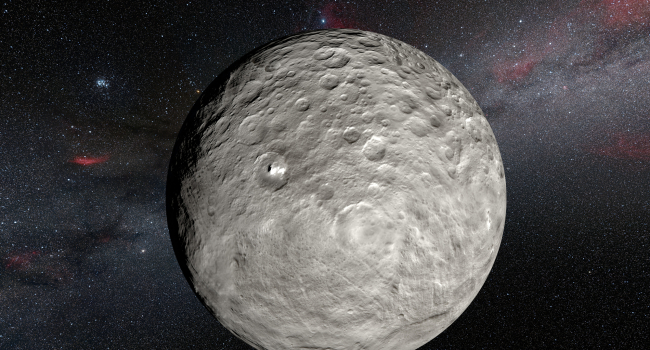
Dwarf planet Ceres could be a great place to search for alien life: What makes it so special?
Recent research has shed light on the intriguing potential for the dwarf planet Ceres to harbor alien life, revealing the influence of asteroid impacts on the presence of organic aliphatic molecules on its surface.
In 2017, scientists analyzing data from NASA's Dawn spacecraft detected aliphatic molecules near a 32-mile-wide impact crater on Ceres, sparking investigations into their origins. A new study, conducted at the Instituto de Astrofisica de Andalucia in Spain, suggests that these organic compounds may be more widespread and resilient than initially assumed, with impacts playing a key role in their distribution.
Conducted at NASA's Ames Vertical Gun Range in California, experiments simulated impact conditions similar to those expected on Ceres, further corroborating the connection between asteroid strikes and the prevalence of organic compounds. By integrating data from Dawn's camera and imaging spectrometer, researchers were able to map organic-rich areas in greater detail, revealing a strong correlation between organic distribution and regions of older impacts over billions of years.
Although the precise origins of these organics remain enigmatic, the mounting evidence suggests that they were likely formed within Ceres and potentially in the presence of water, stated Juan Rizos, one of the study's co-authors. According to him, this discovery hints at the possibility of a significant reservoir of organics within Ceres, amplifying its astrobiological significance.
The importance of further exploring Ceres is emphasized in the 2023-2032 decadal survey for planetary science and astrobiology, marking it as a high-priority target for potential future sample return missions. In parallel, NASA's Lucy mission is set to investigate 10 trojan asteroids, enabling comparative analyses between the impact histories and compositions of Ceres and the trojans. Such comparisons are expected to deepen our understanding of the dispersion of these organic molecules throughout the outer solar system.
The new research, presented at the Geological Society of America's GSA Connects 2023 meeting, has opened up intriguing possibilities for Ceres' role in our understanding of the potential for extraterrestrial life within our solar system.
- Related News
- Wheel of Death: new method will help astronauts stay fit in low gravity
- Due to anomalies of Orion spacecraft, lunar exploration program may be delayed for years։ NASA
- TAO Observatory: World's highest telescope to study evolution of galaxies and exoplanets
- Powerful M9.5 solar flare causes radio blackout in Pacific Ocean
- What will happen to the Earth if the Moon disappears?
- Key to conquering the Red Planet: Why is NASA studying solar storms on Mars?
- Most read
month
week
day
- Digital Julfa Network is launching a pan-Armenian centre in the metaverse, on the Fastexverse virtual platform 928
- Xiaomi unveils exclusive Redmi Note 13 Pro+ dedicated to Messi and Argentina national team 815
- Sparkles: Boston Dynamics unveils a furry robot dog that can dance (video) 802
- Is there a ninth planet in the solar system? Scientists find new evidence 679
- Smartphone catches fire in child's hand in Russia 658
- What will happen to the Earth if the Moon disappears? 656
- How to understand how protected a smartphone is from water and dust? 639
- iPhone 16 may get colored matte glass back panel, 7 colors 623
- World's largest 3D printer was created in USL It prints 29 meter-long structures 623
- New iPad Pro to receive M4 chip and to be more powerful than Apple computers 613
- Archive
